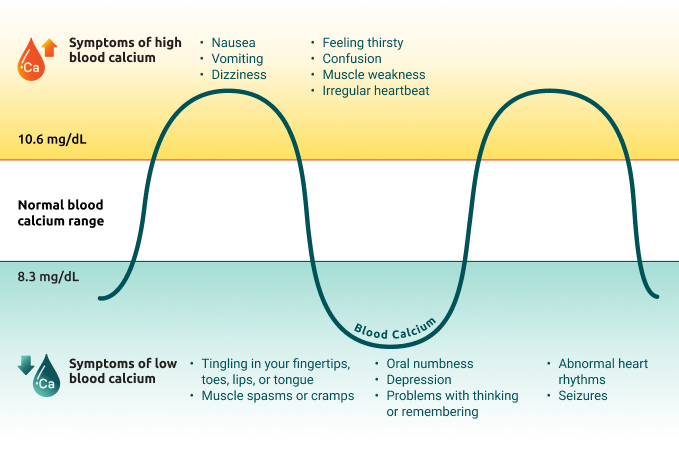IMPORTANT SAFETY INFORMATION AND USE
What is YORVIPATH® used for?
YORVIPATH is a prescription medicine used to treat adults with low parathyroid hormone (PTH) (hypoparathyroidism).
- It is not known if YORVIPATH is safe and effective in people who have been recently diagnosed with hypoparathyroidism after surgery, or if it is started in people with low levels of calcium in the blood.
- It is not known if YORVIPATH is safe and effective in children.
- YORVIPATH should not be used in children and young adults whose bones are still growing.
What is the most important information I should know about YORVIPATH?
YORVIPATH may cause serious side effects, including:
- High levels of calcium in the blood (hypercalcemia). YORVIPATH can cause some people to have higher blood calcium levels than normal. Your healthcare provider should check your blood calcium before you start and during your treatment with YORVIPATH. Tell your healthcare provider right away if you have nausea, vomiting, dizziness, feeling thirsty, confusion, muscle weakness, or irregular heartbeat. Hypercalcemia is more likely to occur within the first 3 months of starting YORVIPATH, but it may occur at any time.
- Low levels of calcium in the blood (hypocalcemia). People who stop using, miss, or change a dose of YORVIPATH may have an increased risk of low blood calcium levels, but hypocalcemia may occur at any time. Tell your healthcare provider right away if you have tingling in your fingertips, toes, lips or tongue, muscle spasms or cramps, oral numbness, depression, have problems thinking or remembering, abnormal heart rhythms, or seizures.
- Possible bone cancer (osteosarcoma). Tell your healthcare provider right away if you have pain in any areas of your body that does not go away or any new or unusual lumps or swelling under your skin that is tender to touch. These are some of the signs and symptoms of osteosarcoma and your healthcare provider may need to do further tests.
Who should not take YORVIPATH?
Do not use YORVIPATH if you are allergic to palopegteriparatide or any of the other ingredients in YORVIPATH.
What should I tell my healthcare provider before taking YORVIPATH?
Before using YORVIPATH, tell your healthcare provider about all of your medical conditions, including if you:
- are at higher risk of a type of bone cancer called osteosarcoma. This is especially important:
- if you have a bone disease that increases your risk of developing osteosarcoma (including if you have Paget’s disease).
- if a blood test shows that you have unexplained increases in bone alkaline phosphatase.
- if you have cancer of the bones or other cancer that has spread to your bones.
- if you are having or have had radiation therapy to the skeleton.
- if you are affected with a condition that runs in your family that can increase your chance of getting cancer in your bones.
- take medicines that contain digoxin, are used to treat osteoporosis, or can affect calcium levels in your blood.
- are pregnant or plan to become pregnant. It is not known if YORVIPATH will harm your unborn baby. Tell your healthcare provider if you become pregnant during treatment with YORVIPATH.
- are breastfeeding or plan to breastfeed. It is not known if YORVIPATH passes into your breast milk. Talk to your healthcare provider about the best way to feed your baby during treatment with YORVIPATH.
Tell your healthcare provider about all the medicines you take, including prescription and over-the-counter medicines, vitamins, and herbal supplements. YORVIPATH and other medicines may affect each other causing side effects.
What are the possible side effects of YORVIPATH?
YORVIPATH may cause serious side effects:
- Allergic (hypersensitivity) reaction, including anaphylaxis. Stop taking YORVIPATH and tell your healthcare provider or get emergency medical help right away if you have swelling of your face, lips, mouth, or tongue, breathing problems, fainting, dizziness, feeling lightheaded (low blood pressure), fast heartbeat, itching, rash, or hives.
- Decrease in blood pressure when you change positions (orthostatic hypotension). Some people may feel dizzy, get a fast heartbeat, or feel light-headed right after injecting YORVIPATH. For the first few doses, give your injection of YORVIPATH in a place where you can sit or lie down right away if you get these symptoms. If your symptoms get worse or do not go away, contact your healthcare provider before you continue using YORVIPATH.
- Digoxin toxicity if you are using digoxin and YORVIPATH at the same time. Tell your healthcare provider if you experience irregular heart rhythm, heart palpitations, confusion, loss of appetite, nausea, vomiting, diarrhea, or vision problems.
The most common side effects of YORVIPATH include injection site reactions, vasodilatory signs or symptoms such as a drop in blood pressure or lightheadedness when standing up, headache, diarrhea, back pain, high calcium levels, and sore throat.
These are not all of the possible side effects of YORVIPATH. Call your doctor for medical advice about side effects. You are encouraged to report side effects to FDA at 1-800-FDA-1088 or at www.fda.gov/medwatch. You may also report side effects to Ascendis Pharma at 1-844-442-7236.
Please click here for full Prescribing Information for YORVIPATH, including the Medication Guide.
